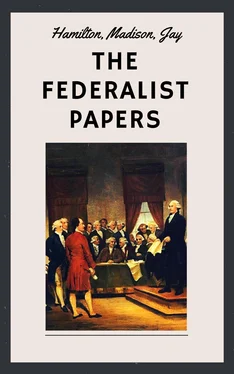The army under such circumstances may usefully aid the magistrate to suppress a small faction, or an occasional mob, or insurrection; but it will be unable to enforce encroachments against the united efforts of the great body of the people.
In a country in the predicament last described, the contrary of all this happens. The perpetual menacings of danger oblige the government to be always prepared to repel it; its armies must be numerous enough for instant defense. The continual necessity for their services enhances the importance of the soldier, and proportionably degrades the condition of the citizen. The military state becomes elevated above the civil. The inhabitants of territories, often the theatre of war, are unavoidably subjected to frequent infringements on their rights, which serve to weaken their sense of those rights; and by degrees the people are brought to consider the soldiery not only as their protectors, but as their superiors. The transition from this disposition to that of considering them masters, is neither remote nor difficult; but it is very difficult to prevail upon a people under such impressions, to make a bold or effectual resistance to usurpations supported by the military power.
The kingdom of Great Britain falls within the first description. An insular situation, and a powerful marine, guarding it in a great measure against the possibility of foreign invasion, supersede the necessity of a numerous army within the kingdom. A sufficient force to make head against a sudden descent, till the militia could have time to rally and embody, is all that has been deemed requisite. No motive of national policy has demanded, nor would public opinion have tolerated, a larger number of troops upon its domestic establishment. There has been, for a long time past, little room for the operation of the other causes, which have been enumerated as the consequences of internal war. This peculiar felicity of situation has, in a great degree, contributed to preserve the liberty which that country to this day enjoys, in spite of the prevalent venality and corruption. If, on the contrary, Britain had been situated on the continent, and had been compelled, as she would have been, by that situation, to make her military establishments at home coextensive with those of the other great powers of Europe, she, like them, would in all probability be, at this day, a victim to the absolute power of a single man. It is possible, though not easy, that the people of that island may be enslaved from other causes; but it cannot be by the prowess of an army so inconsiderable as that which has been usually kept up within the kingdom.
If we are wise enough to preserve the Union we may for ages enjoy an advantage similar to that of an insulated situation. Europe is at a great distance from us. Her colonies in our vicinity will be likely to continue too much disproportioned in strength to be able to give us any dangerous annoyance. Extensive military establishments cannot, in this position, be necessary to our security. But if we should be disunited, and the integral parts should either remain separated, or, which is most probable, should be thrown together into two or three confederacies, we should be, in a short course of time, in the predicament of the continental powers of Europe—our liberties would be a prey to the means of defending ourselves against the ambition and jealousy of each other.
This is an idea not superficial or futile, but solid and weighty. It deserves the most serious and mature consideration of every prudent and honest man of whatever party. If such men will make a firm and solemn pause, and meditate dispassionately on the importance of this interesting idea; if they will contemplate it in all its attitudes, and trace it to all its consequences, they will not hesitate to part with trivial objections to a Constitution, the rejection of which would in all probability put a final period to the Union. The airy phantoms that flit before the distempered imaginations of some of its adversaries would quickly give place to the more substantial forms of dangers, real, certain, and formidable.
PUBLIUS
1. This objection will be fully examined in its proper place, and it will be shown that the only natural precaution which could have been taken on this subject has been taken; and a much better one than is to be found in any constitution that has been heretofore framed in America, most of which contain no guard at all on this subject.
FEDERALIST No. 9. The Union as a Safeguard Against Domestic Faction and Insurrection
For the Independent Journal. Wednesday, November 21, 1787
HAMILTON
To the People of the State of New York:
A FIRM Union will be of the utmost moment to the peace and liberty of the States, as a barrier against domestic faction and insurrection. It is impossible to read the history of the petty republics of Greece and Italy without feeling sensations of horror and disgust at the distractions with which they were continually agitated, and at the rapid succession of revolutions by which they were kept in a state of perpetual vibration between the extremes of tyranny and anarchy. If they exhibit occasional calms, these only serve as short-lived contrast to the furious storms that are to succeed. If now and then intervals of felicity open to view, we behold them with a mixture of regret, arising from the reflection that the pleasing scenes before us are soon to be overwhelmed by the tempestuous waves of sedition and party rage. If momentary rays of glory break forth from the gloom, while they dazzle us with a transient and fleeting brilliancy, they at the same time admonish us to lament that the vices of government should pervert the direction and tarnish the lustre of those bright talents and exalted endowments for which the favored soils that produced them have been so justly celebrated.
From the disorders that disfigure the annals of those republics the advocates of despotism have drawn arguments, not only against the forms of republican government, but against the very principles of civil liberty. They have decried all free government as inconsistent with the order of society, and have indulged themselves in malicious exultation over its friends and partisans. Happily for mankind, stupendous fabrics reared on the basis of liberty, which have flourished for ages, have, in a few glorious instances, refuted their gloomy sophisms. And, I trust, America will be the broad and solid foundation of other edifices, not less magnificent, which will be equally permanent monuments of their errors.
But it is not to be denied that the portraits they have sketched of republican government were too just copies of the originals from which they were taken. If it had been found impracticable to have devised models of a more perfect structure, the enlightened friends to liberty would have been obliged to abandon the cause of that species of government as indefensible. The science of politics, however, like most other sciences, has received great improvement. The efficacy of various principles is now well understood, which were either not known at all, or imperfectly known to the ancients. The regular distribution of power into distinct departments; the introduction of legislative balances and checks; the institution of courts composed of judges holding their offices during good behavior; the representation of the people in the legislature by deputies of their own election: these are wholly new discoveries, or have made their principal progress towards perfection in modern times. They are means, and powerful means, by which the excellences of republican government may be retained and its imperfections lessened or avoided. To this catalogue of circumstances that tend to the amelioration of popular systems of civil government, I shall venture, however novel it may appear to some, to add one more, on a principle which has been made the foundation of an objection to the new Constitution; I mean the ENLARGEMENT of the ORBIT within which such systems are to revolve, either in respect to the dimensions of a single State or to the consolidation of several smaller States into one great Confederacy. The latter is that which immediately concerns the object under consideration. It will, however, be of use to examine the principle in its application to a single State, which shall be attended to in another place.
Читать дальше












